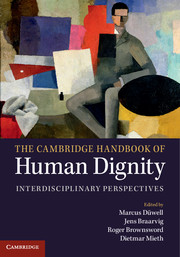Book contents
- Frontmatter
- Contents
- List of contributors
- Foreword
- Why a handbook on human dignity?
- Acknowledgments
- 1 Human dignity from a legal perspective
- 2 Human dignity: concepts, discussions, philosophical perspectives
- Part I Origins of the concept in European history
- Part II Beyond the scope of the European tradition
- 13 The concepts of human dignity in moral philosophies of indigenous peoples of the Americas
- 14 Human dignity in the Islamic world
- 15 Hinduism: the universal self in a class society
- 16 Buddhism: inner dignity and absolute altruism
- 17 Human dignity in traditional Chinese Confucianism
- 18 Dignity in traditional Chinese Daoism
- Part III Systematic conceptualization
- Part IV Legal implementation
- Part V Conflicts and violence
- Part VI Contexts of justice
- Part VII Biology and bioethics
- Appendix 1 Further reading
- Appendix 2 Universal Declaration of Human Rights
- Index
- References
17 - Human dignity in traditional Chinese Confucianism
from Part II - Beyond the scope of the European tradition
Published online by Cambridge University Press: 05 March 2015
- Frontmatter
- Contents
- List of contributors
- Foreword
- Why a handbook on human dignity?
- Acknowledgments
- 1 Human dignity from a legal perspective
- 2 Human dignity: concepts, discussions, philosophical perspectives
- Part I Origins of the concept in European history
- Part II Beyond the scope of the European tradition
- 13 The concepts of human dignity in moral philosophies of indigenous peoples of the Americas
- 14 Human dignity in the Islamic world
- 15 Hinduism: the universal self in a class society
- 16 Buddhism: inner dignity and absolute altruism
- 17 Human dignity in traditional Chinese Confucianism
- 18 Dignity in traditional Chinese Daoism
- Part III Systematic conceptualization
- Part IV Legal implementation
- Part V Conflicts and violence
- Part VI Contexts of justice
- Part VII Biology and bioethics
- Appendix 1 Further reading
- Appendix 2 Universal Declaration of Human Rights
- Index
- References
Summary
The core of Chinese Confucianism concerns personhood: it addresses questions as to how to conduct oneself and what kind of person one should be. The basic notions of Chinese Confucianism are benevolence, righteousness, ritual, wisdom and integrity. The Confucian concept of human dignity is deeply interwoven with these core concepts of Confucianism. Human dignity in Confucianism addresses core questions of Confucian convictions such as how to deal with life and death, honour and disgrace, loyalty etc. This chapter will present central doctrines to these questions of the main representatives of Confucianism and attempt to disclose how human dignity may be conceived in this tradition.
Confucius: human dignity and benevolence
Although Confucianism affirms that all human life is valuable, in case of conflict, in cases wherein one has to risk his life in order to uphold benevolence and righteousness, the latter take priority over life itself. ‘Benevolence’ in Confucianism indicates care for other people and social groups. Fan Chi, a student of Confucius, once asked his master as to the meaning of benevolence. The master responded that benevolence means to love people: benevolence means to love genuinely or authentically, to desire the well-being of others without seeking to profit from their well-being oneself. The virtue of benevolence is what makes life valuable: a life without benevolence is a life not worth living. Thus, Confucius claims that ‘for gentlemen of purpose and men of benevolence, while it is inconceivable that they should seek to stay alive at the expense of benevolence, it may happen that they have to accept death in order to accomplish benevolence’ (Confucius 2008: 15: 9). In circumstances wherein a specific person does not live in accordance with the requirements of benevolence or even acts in opposition to these, his life is no longer valuable: a life without benevolence is a life without dignity. Hence, even in the tragic situation wherein the act of benevolence would entail death, Confucianism holds that benevolence is morally overriding because the alternative – an undignified life – is hardly a life at all. However, benevolence cannot be externally enforced; Confucius says that ‘the practice of benevolence depends on oneself alone, and not on others’ (Confucius 2008: 12: 1). To live in accordance with dignity depends wholly on the individual person: benevolence can only have its ground in free choice.
- Type
- Chapter
- Information
- The Cambridge Handbook of Human DignityInterdisciplinary Perspectives, pp. 177 - 181Publisher: Cambridge University PressPrint publication year: 2014
References
- 3
- Cited by



